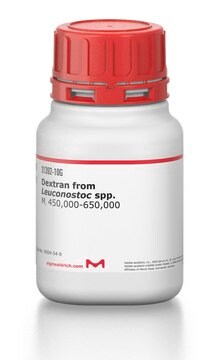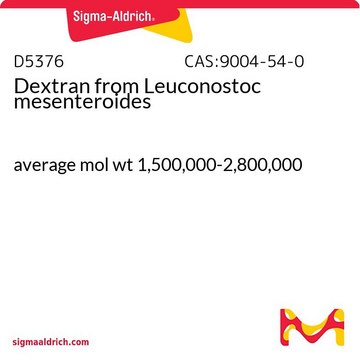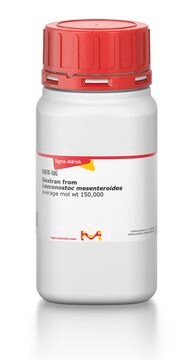31423
Dextran from Leuconostoc mesenteroides
for GPC, Mw 270,000
Autenticatiper visualizzare i prezzi riservati alla tua organizzazione & contrattuali
About This Item
Formula condensata:
(C6H10O5)n
Numero CAS:
Numero CE:
Numero MDL:
Codice UNSPSC:
12352201
NACRES:
NA.24
Prodotti consigliati
Grado
for GPC
Livello qualitativo
PM
Mn ~165,000
Mp ~195,000
Mw ~270,000
Classi chimiche degli analiti
oligosaccharides
tecniche
gel permeation chromatography (GPC): suitable
Mw/Mn
~1.64
applicazioni
food and beverages
Formato
neat
InChI
1S/C18H32O16/c19-1-5(21)9(23)10(24)6(22)3-31-17-16(30)14(28)12(26)8(34-17)4-32-18-15(29)13(27)11(25)7(2-20)33-18/h1,5-18,20-30H,2-4H2
FZWBNHMXJMCXLU-UHFFFAOYSA-N
Cerchi prodotti simili? Visita Guida al confronto tra prodotti
Descrizione generale
Dextrans are polysaccharides with molecular weights ≥1,000 Dalton, with a linear backbone of α-linked D-glucopyranosyl repeating units. Dextrans are found as bacterial extracellular polysaccharides. They are synthesized from sucrose by Leuconostoc mesenteroides and Lactobacillus brevis. Bacteria employ dextran in biofilm formation or as a protective coating to evade host phagocytes in the case of pathogenic bacteria.
Dextran from Leuconostoc mesenteroides (Mw: 270,000) may be used as an analytical standard to calibrate the column for gel permeation chromatography (GPC).
Dextran from Leuconostoc mesenteroides (Mw: 270,000) may be used as an analytical standard to calibrate the column for gel permeation chromatography (GPC).
Applicazioni
Use of dextrans as long and hydrophilic spacer arms improves the performance of immobilized proteins acting on macromolecules.
Codice della classe di stoccaggio
11 - Combustible Solids
Classe di pericolosità dell'acqua (WGK)
WGK 2
Dispositivi di protezione individuale
Eyeshields, Gloves, type N95 (US)
Scegli una delle versioni più recenti:
Possiedi già questo prodotto?
I documenti relativi ai prodotti acquistati recentemente sono disponibili nell’Archivio dei documenti.
I clienti hanno visto anche
Ana Luisa Miranda-Vilela et al.
Journal of biomedical nanotechnology, 9(7), 1261-1271 (2013-08-06)
This work aimed to test a dextran-functionalized magnetic fluid (DexMF) sample in mediating magnetohyperthermia to treat an advanced clinical Ehrlich-solid-tumor, to verify the effects of oral antioxidant administration of pequi-oil on this treatment and to investigate the potential of these
Farwa Sarwat et al.
Pakistan journal of pharmaceutical sciences, 26(4), 793-797 (2013-07-03)
Leuconostoc are known to produce dextran, which have great commercial importance in chemical, medical and food industry. The present study is an attempt to select the best medium for the isolation of indigenous dextran producing Leuconostoc, measuring their enzyme activities
Wai-Leung Langston Suen et al.
Investigative ophthalmology & visual science, 54(6), 4358-4365 (2013-06-01)
This study aims to determine the in vivo effectiveness of low-frequency ultrasound in mediating the transport of macromolecules to the posterior segment of the eye via transscleral route. It investigates if damage is caused by ultrasound at the tested operation
Michael J Pitman et al.
The Annals of otology, rhinology, and laryngology, 122(4), 283-287 (2013-05-24)
We investigated the quantity of recurrent laryngeal nerve motoneurons (RLNMs) that survive after transection and anastomosis of the rat recurrent laryngeal nerve (RLN), as well as the impact of the anastomosis site on RLN regeneration. Ten rats underwent right RLN
Lamiaa M A Ali et al.
Journal of biomedical nanotechnology, 9(7), 1272-1285 (2013-08-06)
Superparamagnetic iron oxide nanoparticles (SPIONs) are inorganic nanomaterials gaining strong clinical interest due to their increasing number of biological and medical applications. The stabilization of SPIONs in a biocompatible stable suspension (bioferrofluid) is generally achieved by an adequate polymeric coating.
Il team dei nostri ricercatori vanta grande esperienza in tutte le aree della ricerca quali Life Science, scienza dei materiali, sintesi chimica, cromatografia, discipline analitiche, ecc..
Contatta l'Assistenza Tecnica.





